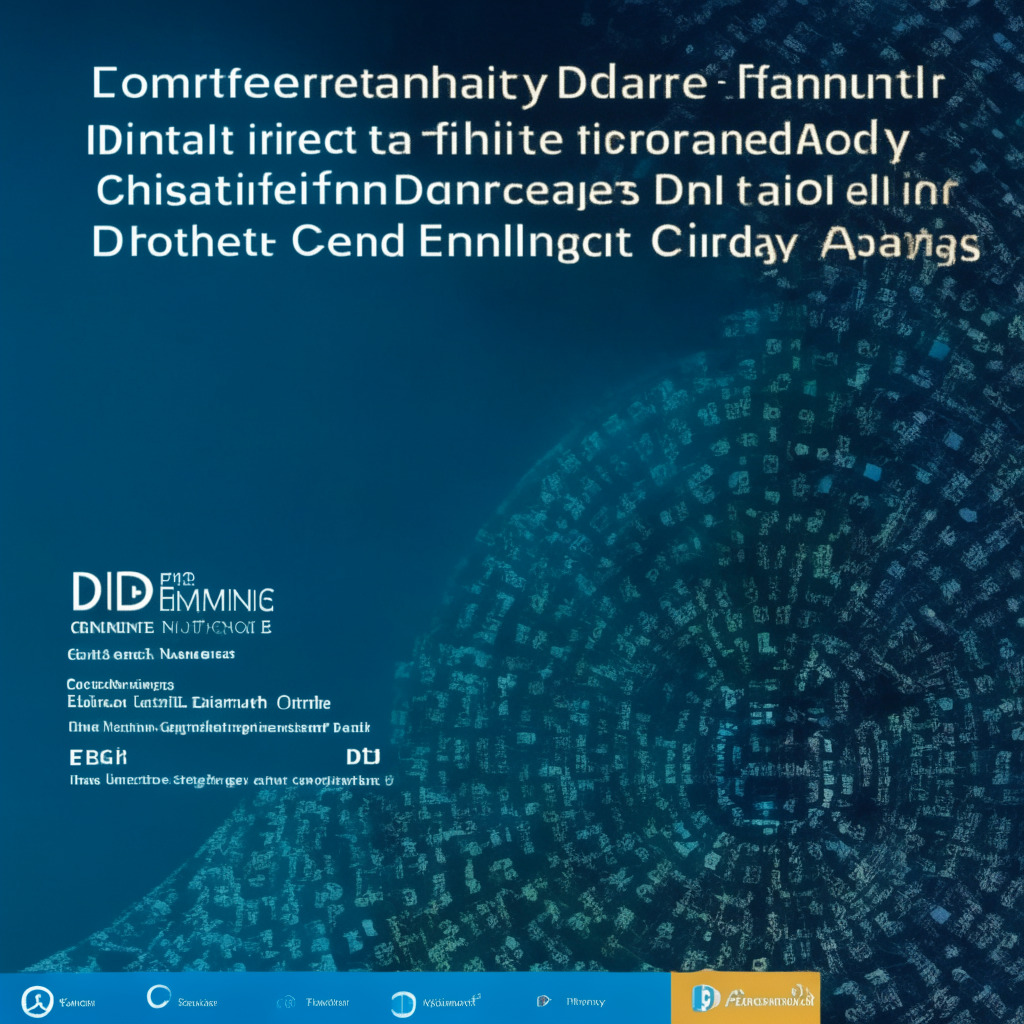Nigeria’s eNaira marks its first anniversary, with the IMF examining its performance and highlighting areas for improvement. Although praised as the second central bank digital currency (CBDC), slow adoption rates and delayed goals pose challenges. The IMF suggests innovative strategies and leveraging existing market networks to promote adoption and address remittance limitations.
Search Results for: MIT
Crypto’s Role in Longevity: NewLimit’s Quest for Curing Aging and Blockchain Implications
NewLimit, a longevity pharma startup co-founded by Coinbase CEO Brian Armstrong, aims to extend human lifespan through epigenetic reprogramming. With $40 million raised in Series A funding, the startup explores the intersection of cryptocurrency, blockchain technology, and life sciences research, highlighting the potential convergence of these fields.
Imitation Crypto Exchange Scam: How Millions Were Stolen, DeFi and Centralized Methods Exposed
Scammers have stolen millions of dollars in cryptocurrency by impersonating HitBTC exchange through a fake website (hitbt2c.lol). They trick users into depositing crypto into fraudulent wallets, which have allegedly accumulated over $15 million. Victims’ funds are directed to multiple blockchain addresses, with the scammers utilizing DeFi tools and centralized methods to cash out stolen crypto.
EU’s DAC8: Balancing Crypto Tax Regulation and Anonymity—Pros and Cons Explored
The European Council approved the Directive on Administrative Cooperation 8 (DAC8) which expands tax reporting requirements to include crypto asset transfers. This move strengthens the EU’s Anti-Money Laundering regulations and enhances their ability to combat tax fraud, evasion, and avoidance in the rapidly growing crypto-asset sector. However, it may also impact the freedom and anonymity of digital assets.
G7 Summit Sparks Crypto Regulation Debate amid North Korea Hacking Concerns
The G7 central bank governors and finance ministers’ summit has highlighted the urgent need for regulatory measures to prevent North Korea’s hacking activities involving cryptocurrencies. Japan calls for other nations to follow its lead in blocking North Korea’s raids, emphasizing the importance of a robust regulatory framework to address growing concerns surrounding crypto theft and misuse as global crypto adoption increases.
Tamadoge’s Web3 Gaming Leap: Embracing Innovation While Mitigating Risks
Tamadoge announces the launch of its new website, combining blockchain, smart contracts, and NFTs to offer a captivating gaming ecosystem with true digital asset ownership. However, users must be diligent in recognizing inherent risks related to emerging technologies and cybersecurity threats.
G7 Committee’s CBDC Support: Exploring Pros, Cons, and Global Implications
The G7 committee discussed central bank digital currencies (CBDCs) and cryptocurrency asset transfer regulations, emphasizing the need for transparency, rule of law, sound economic governance, cybersecurity, and data protection. They welcomed the IMF’s ongoing work on a CBDC Handbook and acknowledged potential drawbacks, such as privacy concerns and increased centralization.
G-7’s Commitment to Crypto Regulations: Balancing Innovation and Financial Stability
The G-7 countries announced their commitment to enforcing forthcoming cryptocurrency regulations proposed by the Financial Stability Board (FSB) and the International Monetary Fund (IMF), aiming to boost confidence in the growing crypto industry and create a safer, more transparent environment for all participants.
Blockchain Future: Captivating Potential vs. Real-World Limitations
Blockchain technology holds potential to revolutionize industries like finance, healthcare, and supply chain management by enhancing security, transparency, and efficiency. However, challenges like scalability, regulatory hurdles, and environmental impact must be addressed to fulfill its promise.
SEC’s Crypto Transparency Under Fire: Will Gensler Meet Committee’s Deadline?
The House Financial Services Committee accuses SEC Chair Gary Gensler of avoiding requests for information on cryptocurrency-related matters, resulting in threats of a hearing. Committee members demand clarification on digital asset exchanges registration and whether ether is a security or commodity. Regulatory clarity and open communication are crucial for the growing crypto market.
US House Committee Seeks Crypto Clarity Amid SEC Contradictions and Offshore Exodus
The U.S. House Financial Services Committee aims to clarify digital asset regulations amid contradictory actions from SEC Chair Gary Gensler. As U.S.-based crypto firms consider moving offshore due to regulatory crackdowns, upcoming hearings will address regulatory gaps and potential coordinated efforts by regulators for “Operation Choke Point 2.0” to de-bank the crypto market.
Debating Anonymity in Digital Pounds: CBDCs vs Cryptocurrencies in the UK
At a recent Financial Times Cryptocurrency and Digital Assets Summit, Tom Mutton, the Bank of England’s head of fintech, discussed the UK’s plans for a central bank digital currency (CBDC) focusing on privacy and anonymity. While emphasizing privacy, Mutton stated that anonymity would not be intended for the digital pound and it would not be interoperable with cryptocurrencies. The Bank of England’s approach raises questions on the role of anonymity, privacy, and interoperability in the financial ecosystem.
Bitcoin’s Limitations vs Cardano’s Potential: Blockchain’s Evolution and the Future of Crypto
Charles Hoskinson, founder of Cardano, highlights Bitcoin’s limitations and the potential of programmable money and smart contracts offered by cryptocurrencies like Cardano’s ADA. He suggests blockchain technology can support complex challenges and provide a decentralized, inclusive global system, and emphasizes the importance of adaptability and progress in the fast-paced world of blockchain technology.
Balancing Anonymity & Compliance: Crypto’s Struggle with KYC/AML Regulations and Decentralization
The crypto sector faces the challenge of balancing anonymity and compliance with U.S. regulators demanding adherence to KYC and AML regulations. Blockchain’s future may lean towards AML/KYC compliance to attract institutional investors, while some decentralized protocols may resist due to privacy ideals. The balance between anonymity and compliance is crucial for the crypto sector’s growth and success.
Nigeria’s SEC May Permit Tokenized Offerings, But Not Crypto Trading: A Step Forward or Stalemate?
Nigeria’s Securities and Exchange Commission (SEC) is reportedly considering granting licenses to operate digital exchanges […]
Title: Crypto Clash in Congress: U.S. House Committees to Embark on Unprecedented Joint Hearings for Digital Assets Regulation
The U.S. House of Representatives is taking major strides towards addressing digital asset regulations as […]
The Fall of FTX: A Tale of Fraud, Billion-Dollar Losses, and the Uncertain Future of Crypto
“In a recent blockchain trial, Sam Bankman-Fried is accused of misuse of FTX user funds. His ex-business partner alleges that under his direction, she fraudulently withdrew and invested billions from Alameda. This highlights ongoing concerns over crypto regulation, security, and transparency.”
UK Watchdog Blocks Crypto Ads: A Blow for Binance’s Marketing Plans or a Step Towards Regulatory Compliance?
“The Financial Conduct Authority (FCA) has put restrictions on Rebuildingsociety, a peer-to-peer lending platform partnered with Binance, inhibiting it from issuing crypto ads due to non-compliance with new marketing regulations. This change creates uncertainties and affects the platform’s ability to facilitate Binance’s visibility in the UK market.”
Global Stocks Surge Amid Fed’s Dovisha Remarks: A Temporary Resurgence or a Market Turnaround?
“Renewed optimism over interest rate shifts resulted in a surge in Asian and European stocks, with Japan’s index leading the way. However, concerns over sustainability and the unpredictable dynamics of interest rates persist. Meanwhile, the crypto exchange Binance has frozen Hamas-linked accounts, highlighting potential issues with personal financial autonomy in blockchain technology.”
Gemini’s Bold $24 Million Leap: The Major Expansion into India’s Cryptocurrency Market
Crypto exchange Gemini is expanding in India with a $24 million investment, intended to enhance its operational infrastructure. They’re focusing on enlarging their Gurgaon engineering center and hiring Sachin Ranglani, ex-Paytm exec, as their India subsidiary head. This move reflects their commitment to progress within India’s burgeoning crypto market.
Kennedy’s Bold Crypto Agenda: An Independent Run for Presidency Powered by Bitcoin
“Robert F. Kennedy Jr., a Bitcoin supporter, announced his independent candidacy for presidency. Among his platforms is a positive stance on cryptocurrencies, including campaign finance via Bitcoin, tax exemptions for Bitcoin investors, and potential backing of the U.S. dollar with Bitcoin.”
Navigating the Crypto Maze: Cointelegraph’s Research Terminal -Boon or Bane?
“Cointelegraph’s Research Terminal is a new tool offering quality content about the blockchain and cryptocurrency sphere. Covering a broad range of the crypto ecosystem, this platform aims to keep users informed about industry developments. However, the risk of information overload and misinformation, alongside its exclusivity, could discourage some enthusiasts. The terminal represents a tool potentially empowering for investors but balancing data comprehensiveness and clarity is critical.”
Bitstamp’s Crypto Partnership with European Banks: EU Embrace vs. US Hesitance
Bitstamp, the world’s oldest crypto exchange, is negotiating with three major European banks to enable their entry into cryptocurrency services. This represents the different regulatory approaches between the EU, with its recent progressive MiCA regulations, and the more challenging US environment. Recent restrictions by Bitstamp on specific services for US users highlight this regulatory divergence.
Unraveling Circle’s Launch of Native USDC on Ethereum Layer 2: Innovation, Adoption, and Potential Risks
Circle, the blockchain and finance tech firm, has revealed its native USDC tokens on the Ethereum Layer 2 scaling protocol, Polygon. This move aims to allow smoother accessibility of USDC to users and developers. Businesses using USDC on Polygon can create decentralized applications for near-instant, low-cost transactions, revolutionizing payments, remittances and trading. However, adoption faces challenges including complex technology and security concerns.
OK Group’s Rebranding: Power Consolidation or Crypto Evolution?
The major crypto operator OK Group plans to unite its ventures under the ‘OKX’ brand, signaling a solidified front in the volatile crypto landscape. The move raises concerns around power consolidation, but the group reassures it will maintain existing regulatory frameworks. The phased rebranding approach and commitment to the U.S. as a key operational base add intriguing nuances to this development.
Cyprus’ Crackdown on Unregulated Cryptocurrency: Necessary Protection or Innovation Stifle?
“Cyprus proposes to penalize Crypto Asset Service Providers (CASPs) operating without licenses, with penalties up to €350,000 or five years imprisonment. This rule aims at uniformity in the European Union and protecting investors from financial hazards associated with illicit activities and money laundering.”
Cyprus Tightens Crypto Regulations: A Global Trend or Overreach?
“Cyprus, traditionally a cryptocurrency haven, plans to strengthen its crypto regulations. This includes compulsory registration for crypto service providers with the Cyprus Securities and Exchange Commission (CySEC). Non-compliance risks hefty fines and imprisonment. However, it’s unclear if tighter regulations will boost transparency or hinder blockchain technology growth.”
Journey between PEPE’s Fall and Meme Kombat’s Rise: A Meme Coin Rollercoaster
PEPE, a popular meme coin, has seen significant losses recently, with its value plunging by 84% compared to its record-high price. While certain indicators suggest a potential uplift, the coin’s volatility and weak fundamentals may deter retail traders. Alternative meme coins like Meme Kombat (MK), which has raised over $425,000 in pre-sale and offers options for passive income, might attract investors.
Sam Bankman-Fried Trial Potentially Overhauls Crypto Legal Landscape: A Detailed Analysis
The ongoing trial of crypto bigwig Sam Bankman-Fried could significantly shape the cryptocurrency legal landscape. The defense is focusing on minute details, potentially laying groundwork for a later appeal. The case’s outcome may influence future regulations of blockchain-based businesses.
Ethereum’s Layer 2 Networks: Breakthroughs and Cautions in the Blockchain Sphere
“Ethereum’s integration of layer 2 networks marked a shift in industry practices, with auxilliary networks supporting developers and easing mainnet congestion. Base and Friend.tech, for instance, have seen significant growth. However, Messari’s analysts advise caution due to market uncertainties.”
Unveiling Binance’s $1B Recovery Fund: Generous Aid or Strategic Maneuver?
“Binance’s $1B cryptocurrency recovery fund, the Industry Recovery Initiative (IRI), has reportedly invested only an estimated $30M since its inception, despite large capital commitment. With growing regulatory concerns, unused funds were moved to Binance’s corporate treasury, raising questions about the effectiveness of such recovery initiatives in the evolving blockchain industry.”
Blockchain Blemishes: South American Cybercrime Investigation Unravels Crypto’s Double-Edged Sword
“This story embodies the complexities of the blockchain era: a vortex of opportunities and challenges swirling together. Secure online transactions and financial autonomy are laudable, but the obfuscation and veil of anonymity may inadvertently shield devious individuals, unfurling a global chase through digital footprints across international borders.”































